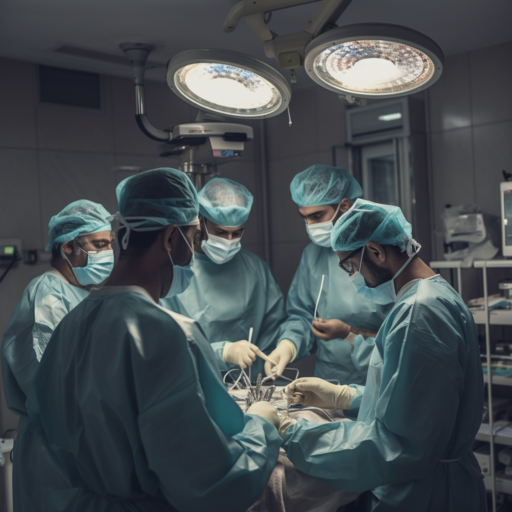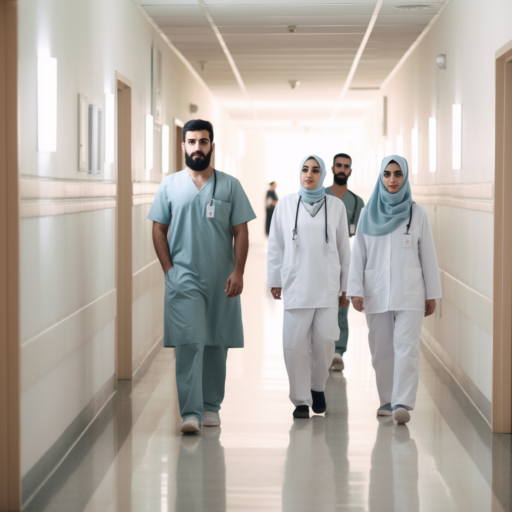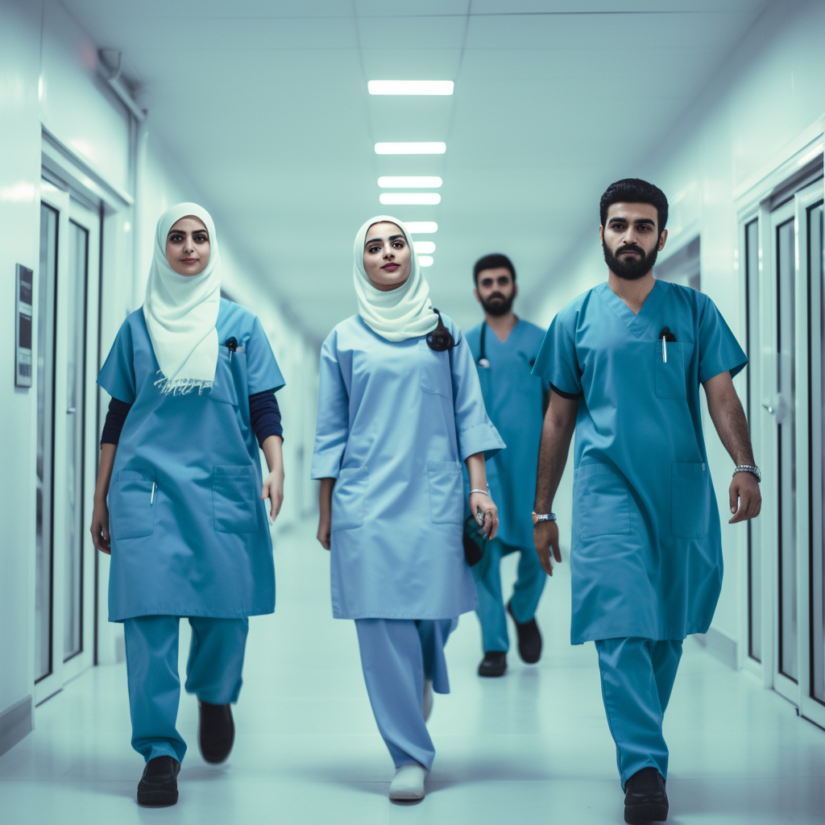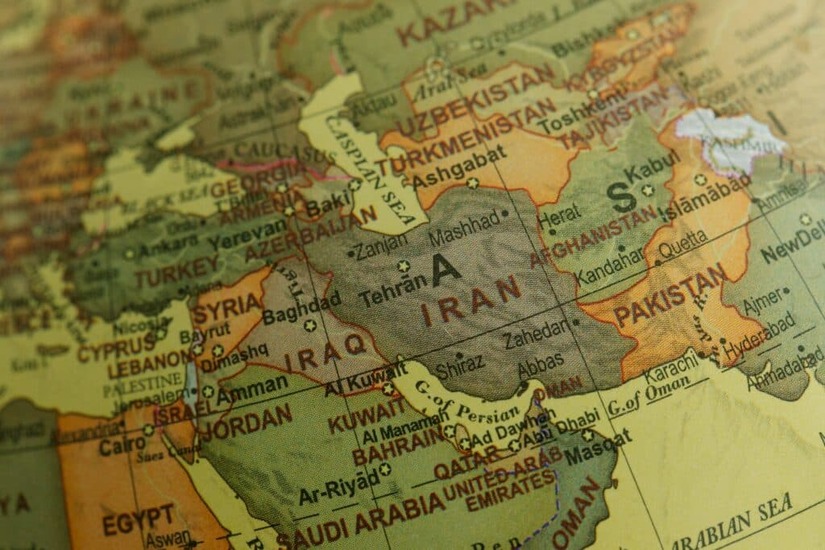Let us take a look at the best hospitals in Saudi Arabia, each of which is known for its cutting-edge technology and kind staff.
Hospitals play a crucial role in the nation’s healthcare system since they are responsible for providing medical treatment and saving patients’ lives.
Several hospitals in Saudi Arabia, a nation well recognized for the advancements it has made in the medical field, stand out for the exceptional care they provide and the dedication they have to the health of their patients.
Over the course of time, considerable advancements have been made in the healthcare infrastructure of Saudi Arabia.
Saudi Arabia is home to an impressive array of hospitals, both public and private, equipped with cutting-edge equipment and staffed by highly trained medical professionals.
Patients with a wide variety of medical needs, both local and from other parts of the globe, are seen and treated at these facilities. Going to the right facility will help you save money in Saudi Arabia.
If you want to invest as an expat or high-net-worth individual, which is what I specialize in, you can email me (advice@adamfayed.com) or use WhatsApp (+44-7393-450-837).
King Faisal Specialist Hospital and Research Center
KFSH&RC is one of the best hospitals in Saudi Arabia, offering advanced medical services across three locations in Riyadh, Jeddah, and Madinah. With a total of 2,415 beds, the hospital provides tertiary and quaternary care to patients in need.
The establishment in question was founded in 1970 in Riyadh, the capital city of Saudi Arabia, on a plot of land generously donated by the late King Faisal Bin Abdulaziz.
It was officially inaugurated in April 1975 by King Khalid Bin Abdulaziz. The establishment currently spans a total land area of 921,000 square meters.
King Faisal Specialist Hospital and Research Centre (KFSH&RC) has a diverse workforce of more than 16,000 individuals representing 63 nationalities.
Medical Services
KFSH&RC is a leading hospital that specializes in providing both inpatient and outpatient medical care.
The hospital is actively involved in various clinical and research studies. It has earned a reputation for being one of the top hospitals in the country, particularly in the fields of Oncology, Cardiovascular Diseases, Organ Transplantation, Genetic Diseases, and Neurosciences.
The King Faisal Specialist Hospital and Research Centre offers highly specialized healthcare services within a dynamic and thriving educational and research setting.
The King Faisal Specialist Hospital and Research Centre (KFSH&RC) has been recognized for its exceptional standards in healthcare.
It has been accredited by the Joint Commission International (JCI), a prestigious organization that evaluates healthcare facilities worldwide.
Awards and Recognition
Additionally, KFSH&RC has achieved Magnet Hospital status, a recognition awarded by the American Nurses Credentialing Centre (ANCC) to only six hospitals outside of the USA.
Recently, KFSH&RC has also been awarded Stage 7 HIMSS Electronic Medical Records, the highest level of using Electronic Health Records, making it the first hospital outside of Northern America to receive this recognition.
The King Faisal Specialist Hospital and Research Center (KFSHRC) in Saudi Arabia has been recognized as one of the top healthcare institutions in the world by Brand Finance’s 2023 ranking. KFSHRC has achieved the 20th position globally and has become the first healthcare institution in the Middle East and Africa to receive this recognition.
According to a report by SPA, the ranking of KFSHRC is attributed to the Health Sector Transformation Program, which is a part of the Vision 2030 initiative in Saudi Arabia.
This ranking is also indicative of the high-quality services offered in the country and the unwavering support provided by Crown Prince Mohammed bin Salman and King Salman bin Abdulaziz to the health sector.
This outcome is a reflection of the hospital’s dedication to providing top-notch and up-to-date healthcare services within a comprehensive educational and research setting.
Expansion
It is now going through a period of substantial growth as a result of the development and subsequent opening of a brand-new medical city that is situated to the north of Jeddah and in close proximity to the airport.
This new hospital’s phase one is scheduled to open either before the end of 2021 or at the beginning of 2022, and it will include more than 1,000 beds, including 152 intensive care unit beds, and 30 operating rooms. Along with fresh new apartments for personnel, the new complex will also have brand-new amenities.
King Abdulaziz Medical City
The King Abdulaziz Medical City in Jeddah, which has a capacity of 751 beds, offers the Saudi Arabian population residing in the Western Region access to state-of-the-art practicing medical care services. It is recognized as one of the best hospitals in Saudi Arabia.
In addition to this, it promotes and furthers people’s awareness of how illness prevention might be accomplished.
In addition to this, it engages in medical basis practice in the institutional, local, regional, national, and worldwide collegial communities by initiating, interacting with, and participating in such practices.
Since its inception in July 1982, the Medical City has made it a priority to maintain the highest possible standards in terms of the quality of patient treatment.
It has been redeveloped to become a component of the King Abdulaziz Medical City in Jeddah. Patients are served by the Primary Healthcare Centers in the Western Region of the MNGHA, which offer the finest preventative and treatment services.
This relieves strain on the hospitals that are part of the MNGHA system.
Medical Facilities and Services
The King Abdulaziz Medical City has continued its strategy of growth and expansion by launching a number of newly created medical projects. These include the following, among others:
- Nursing College at King Saud University for Health Sciences.
- Cardiology Center
- Grand expansion to all ER facilities
- Outpatient clinic center
- Founding the Bone Marrow Plantation Center
- Major expansion to Princess Norah bint Abdulrahman Al Faisal Oncology Center
- Burns Unit
King Abdulaziz Medical City is also present in Riyadh. It is known as KAMC-RD, which began treating patients in May 1983 after first opening its doors.
It is widely regarded as having one of the most developed healthcare systems of any city in Saudi Arabia.
It offers services ranging from public health and basic healthcare to the most cutting-edge tertiary care to Ministry of National Guard members and their families.
These services begin with public health and primary healthcare. In addition, the Medical City provides advanced tertiary treatment to patients who are not members of the National Guard via its medical eligibility system, which is a contribution to the overall national healthcare system.
The KAMC-RD is presently operating with 1973 available beds. There are now 2451 medical professionals, which includes doctors, dentists, and residents. In addition, the medical city is home to 8584 allied health and medical support professionals, as well as 5282 administrative and support staff members.
King Abdullah Medical City
The enormous King Abdullah Medical City (KAMC) is recognized as one of the best hospitals in Saudi Arabia.
The KAMC spans an area of 800,000 square meters over its whole. It was built as part of the National Project for Comprehensive Health Care, which is an initiative of the Ministry of Health to provide high-quality medical care that satisfies the goals and objectives of the country’s leadership.
This project was responsible for its construction. It is designed to accommodate all of the necessities that are necessary for the residents.
Medical Facilities and Services
There are a total of 1500 beds available inside the five-story facility; however, only 500 of those beds have been designated for use by the specialized referral hospital.
The hospital is equipped to handle even the most unusual medical specialized cases.
The medical center contains digital operating rooms that are outfitted for use by surgeons, anesthetists, surgical residents, surgical staff members, and operation room nurses.
This surgical package combines booking, clinical, and patient data to produce a range of administrative and clinical reports. In addition to this, the specialized referral hospital has a total of 500 beds dedicated to obstetrics, gynecological, and pediatric care.
King Fahd Medical City
The King Fahad Medical City Complex, often known as the KFMC, was built between the years 1984 and 1995. It is one of the best hospitals in Saudi Arabia.
There are now 4 hospitals that make up the KFMC complex, and they are as follows: the Main Hospital, the Women’s Specialized Hospital, the Children’s Specialized Hospital, and the Rehabilitation Hospital.
One institution, four different specialist centers, labs, and primary care clinics are all included in the complex.
The Main Hospital is a specialist hospital that offers dentistry services, surgical specialities, critical care, and medical specializations.
It has 460 patient beds. In addition to increasing the treatment of illnesses via medical research and specialized medical training programs, it also makes a contribution to the education and teaching of health-related topics at the local level.
In the summer of 2003, the Children’s Specialized Hospital was established and opened its doors to patients.
With 246 beds, the hospital offers specialized clinical programs and advanced medical care for children under the care of a highly skilled team of physicians, nurses, and other healthcare professionals. The hospital is dedicated to providing exceptional care to this unique patient population.
On October 26th, 2003, the Women’s Specialized Hospital was officially opened with a capacity of 236 beds. The hospital operates in accordance with the latest international principles and standards.
The hospital has demonstrated exceptional proficiency in delivering healthcare services for high-risk pregnancies, managing infertility, and addressing complications that may arise during the early stages of pregnancy.
Additionally, the hospital provides comprehensive healthcare services for women. WSH has established several specialized clinics to fulfill its objective of providing specialized obstetric services.
These clinics are equipped with the necessary facilities to perform various surgical procedures, enabling patients to be discharged within a day without requiring an overnight stay.
The Rehabilitation Hospital, which has a capacity of 150 beds, is the sole healthcare facility under the Ministry of Health (MOH) that offers comprehensive acute rehabilitation services to patients referred to it.
The hospital’s interdisciplinary rehabilitation program is designed to cater to the specific needs of each patient. A collaborative effort is made by medical, nursing, clinical, and administrative staff to help patients reach their full potential as per their prescribed treatment plan.
King Saud Medical City
A multi-phase project in Riyadh, the King Saud Medical City is intended to replace the Kingdom of Saudi Arabia’s original medical hub. A first for the medical facility, a regional trauma center is built on the site. This medical city is one of the best hospitals in Saudi Arabia.
The whole campus is planned to complement the Islamic geometry of the historic district, to optimize the shadowing of a new pedestrian green plaza, and to provide uninterrupted vistas for patients.
The links between the buildings are made possible by pedestrian walkways, which are constantly kept in the shade. Condensate from the buildings is used to hydrate the center green, fill the reflecting pools, and supply water to the buildings and fountains.
Notable Features of King Saud Medical City
The emergency department of the hospital has 102 beds, and it is divided into three acuity zones: high acuity, minor treatment, and quick evaluation.
The treatment rooms have been partitioned into these groups so that they may be appropriately staffed according to the number of patients expected or demographically separated according to the requirements of various cultures.
To provide the utmost level of discretion and convenience for patients, private patient treatment rooms have been subdivided into smaller pods of 12 each.
The primary clinical support spaces are situated in a convenient location so that they may be shared throughout the pods.
On the other hand, all secondary support and staff locations are positioned in the middle of the department to ensure that all acuity zones have equal access to these places.
The patient’s overall experience as well as the flow of staff work will be enhanced as a result of this thoughtful layout of program areas.
Near the door for ambulances is where you’ll find the “trauma” suite, which houses the resuscitation and surgery rooms for trauma patients.
The suite allows for convenient access to imaging facilities, and it also has an enlarged elevator that links trauma patients to the operating room and intensive care unit.
In the event of a rush, the ambulance entrance may be transformed into a decontamination room in addition to its capacity to accommodate several parking spots.
The architecture of the emergency department is completed with rooms that are permanently set aside for decontamination and assistance for EMTs.
Dr. Soliman Fakeeh Hospital
The Dr. Soliman Fakeeh Hospital (DSFH) was established by Dr. Soliman Fakeeh in 1978 and has since become one of the best hospitals in Saudi Arabia.
The hospital has achieved a high level of success in delivering medical services that meet international standards.
History
In 1986, the late King Fahd bin Abdul Aziz inaugurated the first expansion of the hospital. This expansion resulted in a doubling of the inpatient capacity and the introduction of new divisions, such as open-heart surgery, and new clinics, such as neurosurgery, neurology, nephrology, and infertility clinics.

These additions positioned DSFH as a pioneer establishment in the private healthcare sector in the Kingdom. In 1995, the virology laboratory at DSFH successfully conducted a pioneering virus isolation operation for Dengue Hemorrhagic Fever in the Kingdom.
In 1996, the laboratory also identified a new flavivirus. These groundbreaking discoveries have played a crucial role in preventing outbreaks in the western region of the kingdom.
In 1999, the then Crown Prince, King Abdullah bin Abdul Aziz, Custodian of the Two Holy Mosques, oversaw the inauguration of the second expansion of the hospital.
This expansion included two additional premises on the DSFH campus, which currently house the following:
- pediatric clinics
- plastic surgery;
- neonatology; and
- health-promotion and fitness centers.
Accreditation
In 2006, DSFH became the first private hospital in the western region to achieve Joint Commission International accreditation. The hospital has since maintained its accreditation and was most recently reaccredited in 2021.
In 2008, DSFH received accreditation from the Australian Council on Health Care Standards International.
The organization has since been reaccredited multiple times, with the most recent reaccreditation being granted in 2016.
The hospital has been accredited by the American Association of Blood Banks since 2013, with the most recent accreditation received in 2016.
Additionally, it received accreditation from the Central Board for Accreditation of Healthcare Institutes (CBAHI) in 2015.
Furthermore, Fakeeh Hospital has been accredited as Baby-Friendly by the World Health Organization (WHO), making it the sole healthcare provider in Saudi Arabia to receive this recognition as a Baby-Friendly Hospital.
The hospital has been certified with the HASSP accreditation since 2012 and was successfully reaccredited in 2015.
DSFH is a prominent leader in the healthcare industry, known for its innovative approach and forward-thinking strategies that have significantly elevated healthcare delivery standards in the Kingdom and the region.
With a track record spanning four decades, DSFH has earned a reputation as a trailblazer in medical services, having received accreditation from both national and international accreditation bodies.
Medical Facilities and Services
At present, DSFH boasts a bed capacity of 475, along with 120 clinics and 15 operation theaters. Upon completion of its ongoing projects, the facility is projected to expand its bed capacity to 810, clinics to 393, and operation theaters to 39.
Fakeeh offers healthcare services to both adult and pediatric populations in the Kingdom, with a particular focus on Jeddah and the surrounding countries in the Arabian Gulf.
The hospital offers a wide range of medical services, including:
- General surgeries;
- Interventional cardiology;
- Medical radiation and surgical oncology;
- Cardio and thoracic surgeries;
- Internal medicine sub-specialties;
- Dermatology;
- Family medicine;
- Chiropractic;
- Palliative care;
- Dental;
- Obstetrics/gynecology;
- Ophthalmology;
- Pediatrics;
- Emergency services;
- Anesthesia;
- Operating theatres;
- Adult and pediatric intensive care units;
- Immunology;
- Hyperbaric oxygen therapy;
- Allergy;
- Respiratory and sleep disorders;
Additionally, it boasts the most extensive neonatal care unit in the Western Province of the Kingdom.
DSFH is an accredited Academic Training Hospital authorized by the Saudi Commission for Healthcare Specialties to provide training and certification for Board Certified Specialists in five disciplines, namely Medicine, Obstetrics and Gynecology, Pediatrics, Anesthesia, and Orthopedics, as well as a Fellowship in Spine Surgery.
Prince Sultan Military Medical City
Prince Sultan Military Medical City is a prominent military medical facility in the Kingdom of Saudi Arabia, known for its expansive size and scope of services. It is one of the best hospitals in Saudi Arabia.
The facility encompasses a comprehensive range of medical specialities and sub-specialities, and has established itself as a preeminent hub of expertise and consultation for numerous medical and research topics within the Armed Forces Medical Services Hospitals.
It has also been at the forefront of numerous medical advancements. Thanks to the unwavering support of the country’s leaders and the diligent efforts of the highly trained medical staff at PSMMC, a number of rare and complex surgeries have been successfully performed at the facility.
Medical Services and Facilities
The medical procedures performed included bone marrow transplantation, adult liver transplantation, open heart operations, pediatric liver transplantation from living donors, and other rare operations. Notably, some of these procedures were conducted for the first time in the Middle East.
Prince Sultan Military Medical City has made significant advancements in acquiring state-of-the-art medical equipment.
This progress is attributed to the unwavering support of the nation’s leaders, led by HRH Prince Mohammad bin Salman bin Abdul Aziz, Crown Prince, First Deputy Premier Minister, and Minister of Defence.
The support provided has enabled the medical facility to achieve a prominent position among international military medical institutions, with advanced levels of efficiency and capability to fulfill its leading role during both times of peace and war.
Prince Sultan Military Medical City takes pride in offering comprehensive services to support the needs of its patients.
International Medical Center
The IMC facility offers a top-tier healing environment that is comprehensive in nature, making it one of the best hospitals in Saudi Arabia.
This is achieved through the implementation of a well-designed infrastructure, the utilization of advanced technology equipment, and the recruitment and retention of highly skilled physicians, surgeons, paramedics, nurses, and support staff from various parts of the world.
Additionally, the management team and board of directors provide ongoing support to ensure the facility operates at the highest level of excellence.
The key management personnel at IMC comprises professionals who have received education and training from Harvard and other American institutions.
IMC is committed to providing a competitive salary and benefits package to attract and retain the highest quality staff. The implementation of IMC is poised to have a significant impact on the healthcare paradigm in the Middle East.
Dr. Sulaiman Al Habib Medical Group
Due to the fact that it can house up to 360 patients at once, the Dr. Sulaiman Al-Habib Hospital may be considered one of the biggest private hospitals in the Riyadh area. As such, it is one of the best hospitals in Saudi Arabia.
It is also accredited by the Joint Commission International accreditation (JCI) before it passed the first year of its operation, and it has achieved the same certification for the second time in 2014.
The radiological Department of the Hospital was nominated for an award of excellence in diagnostic radiological services in the Middle East for two years in a row, and they ended up taking home the honor in 2011.
In addition to this, its critical care unit is the most extensive of any private institution in the country.
According to the criteria set out by the Joint Commission International accreditation (JCI), the Neonatal Intensive Care Unit (NICU) is considered to be the best possible intensive care unit.
The hospital is home to the world’s most advanced and comprehensive center for the surgical and non-surgical treatment of obesity.
In terms of obesity procedures, patient follow up, and other treatments, this facility has been ranked as the best in its category.
The College of American Pathologists (CAP) is the organization that is responsible for accrediting diagnostic labs.
Medical Facilities and Services
Athletes’ access to high-quality medical treatment has gone a long way since the establishment of the Sports Medicine Unit in the Hospital, which is widely regarded as one of the sector’s most significant turning points.
It has accomplished its goal of being the primary destination for Arab and Gulf sports stars in a very short period of time. The hospital treats orthopedic issues and sports injuries according to standards that are recognized globally.
In order to cure injuries, conduct operations and other surgical treatments, and build rehabilitation programs till returning to the stadiums, the hospital makes use of the most recent technology.
Recent years have seen significant growth in the number of available beds at the hospital, which has now reached 360.
There are 50 beds dedicated to emergency treatment, and 118 beds dedicated to various types of intensive care, including cardiac care, general intensive care, children’s critical care, and neonatal intensive care.
Johns Hopkins Aramco Healthcare

Both Johns Hopkins Medicine, which is a well-regarded academic health organization across the globe, and Saudi Aramco, which is one of the biggest energy businesses in the world, have been at the forefront of their respective industries for a significant amount of time.
Therefore, in 2013, the two joined together to build a brand-new health service for Saudi Aramco workers and their families, expanding the capabilities of the company’s long-established medical facilities.
The hospital is committed to addressing the health difficulties that are encountered by the communities that it serves.
And as part of this effort, it organizes frequent outreach activities to promote more favorable lifestyle choices, in addition to providing a full variety of inpatient and outpatient treatments at its numerous clinics.
Sultan Bin Abdulaziz Humanitarian City
Patients who come here get medical care of the highest possible standard from doctors, nurses, and rehabilitation specialists who have years of relevant professional expertise amongst them. There is no doubt that this is one of the best hospitals in Saudi Arabia.
The goal of the King Abdulaziz City for Health Sciences (SBAHC) is to become a global center of excellence in rehabilitation by meeting or exceeding the most stringent international healthcare standards in the Kingdom of Saudi Arabia.
The complex has more than one million square meters and can be found in the Banban region, which is situated immediately to the north of Riyadh.
The Sultan Bin Abdulaziz Humanitarian City provides workers with comprehensive benefits and pay package that enables them to participate in the organization’s ongoing financial success.
The benefits package that the City offers to its employees includes a broad variety of perks, such as health care, housing accommodation, paid annual leave and ten (10) days of official holidays, insurance coverage, flight ticket from/to place of origin, and local transportation. These perks are only few of the many that are provided.
Pained by financial indecision? Want to invest with Adam?

Adam is an internationally recognised author on financial matters, with over 739.2 million answer views on Quora.com, a widely sold book on Amazon, and a contributor on Forbes.





















Discussion about this post